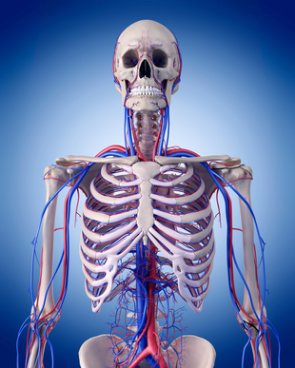Calcium supplements may cause atherosclerosis and heart trouble
 Many people take calcium supplements to prevent osteoporosis. However, research shows that high-dosage calcium supplements may harm your heart and cardiovascular system. It is important that you take calcium in the right balance with vitamin D and magnesium if you want the calcium to get absorbed properly and get all the way into your bones.
Many people take calcium supplements to prevent osteoporosis. However, research shows that high-dosage calcium supplements may harm your heart and cardiovascular system. It is important that you take calcium in the right balance with vitamin D and magnesium if you want the calcium to get absorbed properly and get all the way into your bones.
According to researchers from the Johns Hopkins University School of Medicine in Baltimore, Maryland, people who supplement with large quantities of calcium are at an increased risk of atherosclerosis and heart trouble. These observations support earlier findings, and that is why researchers warn against taking large quantities of calcium, especially as supplements.
The Maryland researchers looked at data from 2,742 men and women aged 45-84 years who had different ethnic background. The study participants had filled in questionnaires about their diet habits and use of calcium supplements to enable the scientists to calculate how much calcium each individual got from various sources. Also, CT scans were made every 10 years in order to compare the level of atherosclerotic plaque in the coronary arteries of the participants. This is a good indicator of the risk of developing cardiovascular disease and blood clots later in life.
Calcium from food and supplements – not the same thing
The researchers divided the participants in five groups based on their total calcium consumption from diet and supplements. They could see that there was a big difference between calcium from the diet and calcium from supplements. Those who got large amounts of calcium from their diet (more than 1,400 mg daily) had a 27 per cent lower risk of developing cardiovascular disease than those who got the least dietary calcium (less than 400 mg daily). On the other hand, the 46 per cent of the people who took calcium supplements had a 22 per cent increased risk of cardiovascular disease. According to nutritionist John Anderson, professor emeritus of nutrition at the University of North Carolina at Chapel Hill’s Gillings School of Global Public Health and co-author of the study, the risk associated with calcium supplements may be linked to their content of calcium salts or perhaps a result of the body having difficulty with metabolizing the large concentrations of calcium taken at once.
Excess calcium accumulates in the vessel wall, increasing the risk of blood clots
Earlier studies have shown that excess calcium from supplements are not effectively cleared from the bloodstream but tend to accumulate in the body’s soft tissues, which essentially include all other tissues than bones, teeth, and cartilage. Once calcium gathers in the blood vessel walls, the risk of atherosclerosis and coronary thrombosis increases.
It is also important to realize that calcium from food gets ingested together with other nutrients that contribute to the metabolism of calcium. It is commonly known that we need vitamin D to help absorb calcium, but we also need magnesium to help calcium get embedded in our bones.
Magnesium and its essential interaction with calcium
The interaction between calcium and magnesium is of fundamental importance to all living cells. Our bones and teeth store around 99 per cent of the body’s calcium content, whereas cells in the soft tissues such as blood vessel walls, muscles, and nervous tissue are almost devoid of calcium, thanks to magnesium which functions as a doorman that effectively controls the amount of calcium that enters and leaves the cells through the calcium channels of the cell membranes.
If we lack magnesium, the calcium channels are left open, and we risk that calcium floods the cells of our soft tissues. As mentioned earlier, this increases our risk of atherosclerosis.
Calcium flooding of the cells in the soft tissues may also destroy the mitochondria, which are the small “power plants” that produce energy in all our cells. In the long run, this may impair our energy production and oxygen utilization, leaving us vulnerable to free radicals that attack the cell membranes and cause damage to our cardiovascular system and other tissues.
|
The relationship between calcium and magnesium
Researchers still disagree on the optimal calcium and magnesium intake. In Denmark, the daily reference intake (DRI) for calcium is 800 mg and 375 mg for magnesium. In other words, there is a 2:1 ratio between the two nutrients. In Japan, the natural intake of the two nutrients is around 1:1, which is because the Japanese don’t consume dairy products and therefore only get around 400-500 mg of calcium daily. On the other hand, they get more magnesium from vegetable sources.
Calcium, magnesium, and osteoporosis worldwideThe Japanese population consumes far less calcium and a lot more magnesium than the Europeans and Americans. Also, the Japanese have a lower rate of bone fractures, where vitamin D and lifestyle factors such as exercise and physical activity may also play a role. |
References:
Johns Hopkins Medicine. Calcium supplements may damage the heart. Science Daily. 2016
https://www.sciencedaily.com/releases/2016/10/161011182621.htm
Andrea Rosanoff et al. Essential Nutrient Interactions: Does Low or Suboptimal Magnesium Interact with Vitamin D and/or Calcium status. Advances in Nutrition 2016
http://advances.nutrition.org/content/7/1/25.full
Mark J Bolland et al. Vascular events in healthy older women receiving calcium supplementation: randomised controlled trial. BMJ 2008
http://www.ncbi.nlm.nih.gov/pmc/articles/PMC2222999/
Fujita T, Fukase M. Comparison of osteoporosis and calcium intake between Japan and United States. PubMed. 2002
http://ebm.sagepub.com/content/200/2/149.short
Search for more information...
- Created on .








